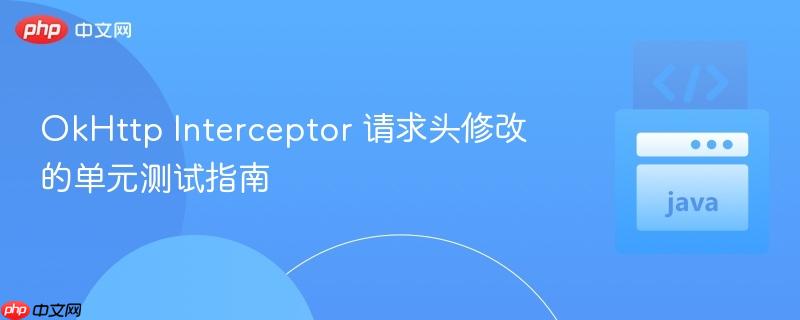
本文详细介绍了如何为 okhttp interceptor 编写有效的单元测试,特别是当拦截器用于修改请求头时。通过模拟 `interceptor.chain` 并利用 spock 框架的参数约束,我们可以精准验证拦截器是否按预期添加或修改了请求头,从而确保拦截器逻辑的正确性,避免了直接依赖实际网络请求的复杂性。
在开发基于 OkHttp 的网络应用时,Interceptor 是一个强大的功能,允许我们在请求发送前或响应接收后对请求或响应进行处理。一个常见的用例是修改请求头,例如添加认证信息。然而,如何有效地单元测试这些修改请求头的拦截器,确保其逻辑正确无误,是开发者常遇到的挑战。本文将深入探讨这一问题,并提供一套专业的测试策略。
首先,我们来看一个典型的 OkHttp Interceptor 实现,它负责向传出的请求中添加一个 Authorization 头:
package de.scrum_master.stackoverflow.q74575745;
import okhttp3.Interceptor;
import okhttp3.Request;
import okhttp3.Response;
import java.io.IOException;
/**
* 一个简单的 OkHttp 拦截器,用于向请求中添加 Authorization 头。
*/
class AuthRequestInterceptor implements Interceptor {
@Override
public Response intercept(Interceptor.Chain chain) throws IOException {
Request original = chain.request();
// 构建一个新的请求,添加 Authorization 头
Request.Builder requestBuilder = original.newBuilder()
.header("Authorization", "auth-value");
Request request = requestBuilder.build();
// 继续处理请求链
return chain.proceed(request);
}
}这个 AuthRequestInterceptor 的核心逻辑在于获取原始请求,创建一个新的 Request.Builder,添加 Authorization 头,然后构建新请求并将其传递给 chain.proceed()。
许多开发者在测试拦截器时,可能会尝试通过构建一个完整的 OkHttpClient 并执行一个实际的网络请求来验证拦截器行为。例如,以下是一个尝试验证 Authorization 头是否被添加的测试代码:
// 初始的(不推荐的)测试尝试
class AuthRequestInterceptorTest extends Specification {
AuthRequestInterceptor authRequestInterceptor = new AuthRequestInterceptor();
OkHttpClient okHttpClient;
void setup() {
// 初始化 OkHttpClient 并添加拦截器
okHttpClient = new OkHttpClient().newBuilder()
.addInterceptor(authRequestInterceptor)
.build();
}
def "Get Authorization in to header"() {
given: "一个空的请求头"
HashMap<String, String> headers = new HashMap<>()
when: "执行一个模拟请求"
Request mockRequest = new Request.Builder()
.url("http://1.1.1.1/heath-check") // 注意:这是一个模拟URL,实际不会发送请求
.headers(Headers.of(headers))
.build()
Response res = okHttpClient.newCall(mockRequest).execute()
then: "尝试从响应中获取 Authorization 头"
// 这里的断言会失败,因为我们无法从 Response 中直接获取到 Request 的头
res.headers("Authorization")
}
}这种测试方法存在一个根本性问题:Response 对象反映的是服务器返回的响应,而不是拦截器修改后发送出去的 Request。即使拦截器成功添加了请求头,我们也无法通过 res.headers("Authorization") 来验证它,因为这个方法检查的是响应头,而非请求头。为了有效测试拦截器对请求的修改,我们需要一种方法来“捕获”拦截器传递给 chain.proceed() 的那个被修改后的 Request 对象。
为了在隔离环境中测试拦截器,并验证其对请求的修改,最佳实践是模拟 Interceptor.Chain。通过模拟 chain,我们可以控制 chain.request() 返回的原始请求,并验证 chain.proceed() 被调用时所传入的参数。
这里我们使用 Spock 框架来演示如何实现这一策略,Spock 以其富有表现力的语法和强大的 Mocking 能力而闻名。
package de.scrum_master.stackoverflow.q74575745
import okhttp3.Interceptor
import okhttp3.Request
import spock.lang.Specification
/**
* AuthRequestInterceptor 的单元测试。
* 核心思想是模拟 Interceptor.Chain,并验证 proceed 方法被调用时传入的 Request 参数。
*/
class AuthRequestInterceptorTest extends Specification {
def "request contains authorization header"() {
given: "一个模拟的拦截器链,它返回一个不带任何头的原始请求"
// Mock Interceptor.Chain 接口
def chain = Mock(Interceptor.Chain) {
// 当 chain.request() 被调用时,返回一个预设的原始请求
request() >> new Request.Builder()
.url("http://1.1.1.1/heath-check")
.build()
}
when: "运行待测试的拦截器"
// 创建 AuthRequestInterceptor 实例并调用其 intercept 方法
new AuthRequestInterceptor().intercept(chain)
then: "验证预期的 Authorization 头已被添加到请求中,并传递给 chain.proceed()"
// 使用 Spock 的参数约束来验证 chain.proceed() 被调用了一次,
// 并且传入的 Request 对象的 Authorization 头包含期望的值。
1 * chain.proceed({ Request request ->
// 这里的闭包会接收到传递给 chain.proceed 的 Request 对象
// 我们可以对这个 Request 对象进行断言
request.headers("Authorization") == ["auth-value"]
})
}
}测试代码解析:
given: "a mock interceptor chain returning a prepared request without headers":
when: "running the interceptor under test":
then: "the expected authorization header is added to the request before proceeding":
// Helper class (如果需要,可包含在项目中)
package de.scrum_master.stackoverflow.q74575745;
class WebClientException extends RuntimeException {
public WebClientException(Throwable cause) {
super(cause);
}
}通过模拟 Interceptor.Chain 并利用 Spock 框架强大的参数约束能力,我们可以高效且精准地单元测试 OkHttp Interceptor 对请求的修改行为。这种方法确保了拦截器逻辑的正确性,同时避免了复杂和不可靠的集成测试。掌握这一技巧,将显著提升 OkHttp 拦截器代码的质量和可维护性。
以上就是OkHttp Interceptor 请求头修改的单元测试指南的详细内容,更多请关注php中文网其它相关文章!

每个人都需要一台速度更快、更稳定的 PC。随着时间的推移,垃圾文件、旧注册表数据和不必要的后台进程会占用资源并降低性能。幸运的是,许多工具可以让 Windows 保持平稳运行。

Copyright 2014-2025 https://www.php.cn/ All Rights Reserved | php.cn | 湘ICP备2023035733号